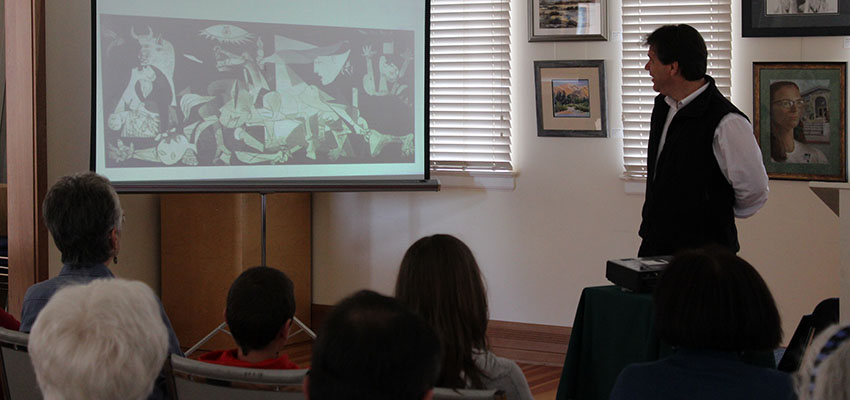On Saturday, 30 people gathered to listen to a talk by historian, Xabier Irujo, at the Heritage Museum in Sparks, NV. The talk on the bombing of Gernika by co-director of the Center for Basque Studies, inaugurated the conference on the memory of Lehendakari Agirre, entitled, “The International Legacy of Lehendakari Jose Antonio Agirre’s Government.” In a conversation with EuskalKultura.com just before, Irujo said that the “worst lies of the 20th century were told,” about the event.
Sparks, NV, USA. The Sparks Heritage Museum filled on Saturday at noon with people interested in a talk by co-director of the Center for Basque Studies, Xabier Irujo. Among those attending were many Basque-Americans, as well as other academics, but Americans who were interested in the historic event. After the talk, Irujo responded to various audience questions making the event last for two hours.
The historian has worked extensively on the bombing of Gernika, above all over the last decade, even though he feels “that there is still a lot to do.” “In history there are very few things that are studied, and of all, in this case, being such a complicated bombing, even less. To which you need to add the fact that Franco prohibited talking about it for four decades and that Germany and Italy denied it for years. Many of the biggest lies of the twentieth century have been told about the bombing of Gernika.”
To date, the majority of work done on this dark chapter in the history of Euskal Herria has to do with the victims, and on what happened “underneath,” as Irujo says. He, nevertheless, researches what happens “above.” “How it was carried out, and to what end. It is something that is beyond all logic, and is difficult to understand.” And that is his job to try and understand and explain it.
The Bombing of Gernika and the Diaspora
The Nazi aviation destroyed Gernika on April 26, 1937 and Picasso finished Guernica in two months. During this period of time, as Irujo has researched, only the USA published more than 7,000 articles on the massacre. The New York Times, for example, had 63 news pieces on the bombing, of which, nearly 40 appeared on the front page. Data that indicates the clear relevance that this barbarism had internationally, before the Spanish artist presented his masterpiece.
Along with this, Irujo believes that the Diaspora can help “in many ways” to clarify what really happened in Gernika. “I have done very valuable interviews in the Diaspora. Given the large number of exiles from the war, the Basques in the Diaspora can interview witnesses. It is a shame that many are very old and are leaving us, but these testimonies are of great value and we should get them as soon as possible.” Besides being something that many newspapers covered in the day, looking for numbers of that time and sending what he found to the Center for Documentation of the Peace Museum in Gernika, provides great information. If more than 7,000 references were published in the USA alone in two months, Irujo said that the amount of information published in South America must be imaginable.
“The Day Gernika was Bombed” coming soon in Euskera
William L. Smallwood, also known as Basilio Egurtxiki, from Idaho, completed his work in 1972 The Day Guernica was Bombed: A Story Told by Witnesses and Survivors. In a list of 124 interviews conducted with adults that survived the bombing. Nevertheless, this work that Irujo considers “a treasurer” wasn’t published until 2012. That year it was published in English. A year later, in 2013, the Spanish version El día en que Gernika fue bombardeada came out in print and as the historian has told us, this year you will be able to find its Basque translation by Ane Undurraga.
*The conference will continue today. Here is the complete program.
**Due to various delays of Angel Vinas’ flight, it is possible that his talk will be given at a later time. For complete information call (775) 784-4854.






 Send to a friend
Send to a friend Add comment
Add comment








